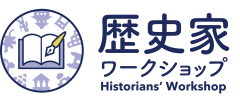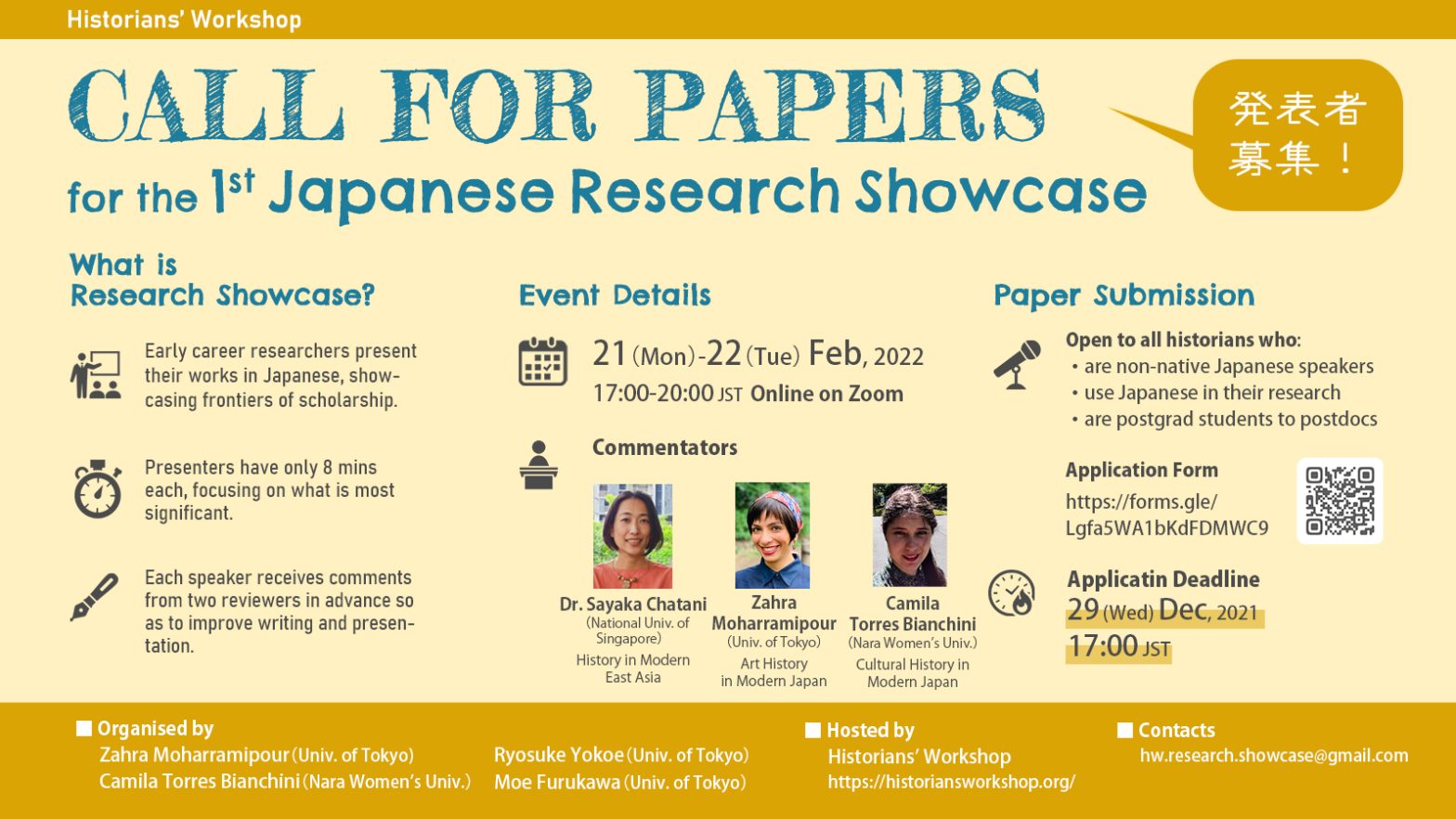At the Historians’ Workshop, we have been regularly organising Research Showcases since 2016 as an event where all presentation and Q&A sessions are conducted in a foreign language, providing a space for early-career researchers in history (postgraduate students, postdocs) to practice their scholarly communication skills.
Backed by popular demand, we’ll be hosting the first of such occasions in Japanese, aimed at Japan-based international students, Japanese and East Asian studies scholars from abroad, and other non-native Japanese speakers. Every presenter will be given 8 minutes to present their research and 7 minutes to receive questions, and, most importantly, receive written feedback on their Japanese presentation scripts beforehand from experienced presenters.
The workshop will take place across two days on 21 and 22 February 2022. We are excited to have Sayaka Chatani (National University of Singapore, global and transnational history in modern East Asia), Zahra Moharramipour (The University of Tokyo, art history in modern Japan), and Camila Torres Bianchini (Nara Women’s University, cultural history in modern Japan) as our commentators. The event will be organised by Moe Furukawa (The University of Tokyo, art history in renaissance and early-modern Italy) and Ryosuke Yokoe (The University of Tokyo, history of medicine in modern Britain), and is open to all disciplines, fields, and approaches that possesses a historical component, including Japanese and East Asian studies, intellectual history, social and economic history, cultural history, science and technology studies, art history, historical geography, and others. We welcome and encourage anyone who is interested in participating in a Japanese-language academic event in the future to apply to this workshop.
Date & Time: 21 and 22 February 2022, 17:00~20:00 (Japan Standard Time)
Venue: Online(Zoom)
Hosts: Moe Furukawa (University of Tokyo), Ryosuke Yokoe (University of Tokyo)
Commentators: Sayaka Chatani (National University of Singapore), Zahra Moharramipour (The University of Tokyo), Camila Torres Bianchini (Nara Women’s University)
Format: 8-minute presentation & 7-minute Q&A session per person
Language: Japanese
Conditions: Non-native Japanese speakers, those who use Japanese in their research, postgraduate students to postdocs (open to all nationalities)
Expected number of speakers: 12
Participation: free
Poster link: here
Application form: https://forms.gle/Lgfa5WA1bKdFDMWC9
Application deadline: 29 December 2021, 17:00 (Japan Standard Time)
Benefits of Participating at a Research Showcase
1)Receive Expert Feedback Before and After the Presentation
All presenters are expected to submit a copy of their presentation scripts and/or slides two weeks before the event and will receive detailed feedback on its content, writing, structure, etc. from experienced collaborators of the Historians’ Workshop. Not only does this help participants improve their Japanese writing skills but it also allows them to confidently present their research on the day of the workshop. Presenters will additionally receive feedback from the organisers and commentators on the day of the event.
2)Research Showcase Prize
Among participants who have not completed their PhD (P.S. the event is open to postdocs as well), a prize will be awarded to the best presenter, judged not on their fluency in the language but on the clarity and persuasiveness of the presentation.
3)An Authentic Seminar Experience
Everything, from the individual panel sessions (presentation, Q&A) to the coffee breaks and end-of-day reception, will be conducted in the language of the event in order to best simulate the experience of participating in a foreign language conference.
4)Q&A Practice
Perhaps the most challenging part of joining a foreign-language research seminar is participating in the Q&A session at the end of each presentation. At the Research Showcase, we provide a safe, non-judgemental space for both audience members and presenters to practice asking and receiving questions, allowing them to engage in discussions and dissect arguments via a language that they’re not used to.
Organisational Committee
Sayaka Chatani (National University of Singapore)
Zahra Moharramipour (The University of Tokyo)
Camila Torres Bianchini (Nara Women’s University)
Moe Furukawa (The University of Tokyo)
Ryosuke Yokoe (The University of Tokyo)
Contacts: hw.research.showcase@gmail.com

